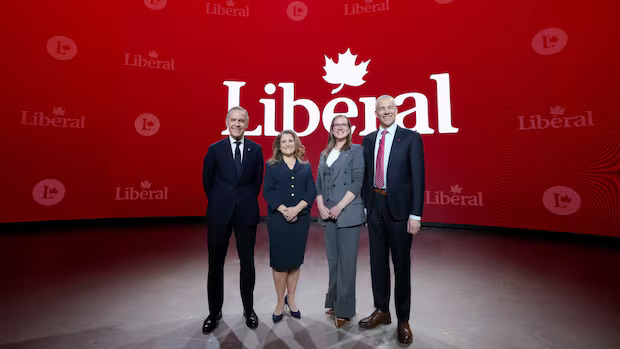Trump Dominates Debate as Liberal Leadership Candidates Clash on Canada’s Future
International International NewsPosted by NewAdmin on 2025-02-25 09:10:27 |
Share: Facebook | Twitter | Whatsapp | Linkedin Visits: 98

The French-language leadership debate for candidates vying to replace Prime Minister Justin Trudeau in the Liberal Party of Canada centered primarily around the threat posed by U.S. President Donald Trump, addressing both his economic policies and his aggressive stance toward Canada. The debate featured four candidates: Mark Carney, former governor of the Bank of Canada; Chrystia Freeland, former Finance Minister; Karina Gould, Liberal House leader; and Frank Baylis, businessman and former MP.
The topic of Trump dominated the early part of the debate. Freeland, who has firsthand experience from her time in government dealing with Trump, warned that the U.S. president represented "the greatest threat to Canada since World War Two." She highlighted her role in renegotiating NAFTA and suggested that Trump's second term in office would pose even greater risks to Canada, particularly with his repeated threats to annex Canada or impose tariffs. Freeland emphasized the need to bolster Canada’s global trade relationships, especially with the EU and the UK, as a countermeasure to Trump’s potential aggression.
Carney, the frontrunner in the polls, acknowledged Trump’s increased isolationist stance but presented himself as a crisis manager capable of handling such threats. He proposed leveraging Canada’s natural resources and investing in clean energy to make the country an economic superpower, and he stated that Canada should be prepared to impose tariffs on the U.S. if Trump proceeds with a planned 25% tariff on Canadian goods.
Baylis proposed the creation of a new economic bloc consisting of Canada, the UK, New Zealand, and Australia, arguing that these nations shared common values and governance systems that could create a strong counterweight to Trump’s influence. Gould, on the other hand, framed her approach as one focused on making life more affordable for Canadians, while also emphasizing the importance of respecting provincial jurisdictions. The debate also delved into broader domestic issues, such as immigration, healthcare, and the cost of living. While all the candidates expressed concerns over the Trudeau government's high immigration targets, they differed in how to address it. Gould admitted that the government had set overly ambitious immigration goals, and Freeland suggested linking immigration policies to housing to ensure affordability. Carney, however, defended maintaining current immigration levels despite criticisms from provinces like Quebec.
The candidates also discussed defense policy, with Freeland and Gould advocating for faster increases in military spending, aiming to reach 2% of Canada’s GDP by 2027. Carney, while agreeing with the need for more defense spending, suggested a more gradual approach, aiming for the 2% target by 2030. On climate change, the issue of carbon taxes was a point of contention. Both Carney and Freeland indicated they no longer supported the Trudeau government’s consumer carbon tax, which has become unpopular with Canadians, instead proposing alternative policies to address climate change and incentivize green energy.
The debate also saw the candidates addressing their vision for Canada’s future. Carney, though criticized for his French-language fluency, positioned himself as a leader capable of navigating complex global crises. Freeland, on the other hand, drew on her extensive experience in government to assert that she was the best candidate to protect Canadian interests. Meanwhile, Gould focused on affordability and her vision for a more inclusive Canada. Baylis, often positioned as the outsider, proposed foreign policy initiatives such as recognizing Palestine as a state, arguing that this would contribute to peace in the Middle East. He also argued for reducing trade barriers within Canada, particularly to ease the movement of natural resources and energy across provinces.
Search
Categories
Recent News
- A Son's Burden: Healthcare Woes in Madhya Pradesh
- Hyderabad Tragedy: Tech Industry Stress Claims Another Life
- Gang-Rape and Social Media: A Dark Intersection in Odisha
- Tragic Discovery at Ranchi Construction Site
- AI Assistant's Unpredictable Behavior Raises Concerns
- Andhra Pradesh's Industrial Renaissance: Naidu's Vision for Nellore
- Pakistan's Security Crisis: Rebels Outgun the Military
- The Sun's X8.3 Flare: Unveiling the Power of Solar Storms
Popular News
- Navigating IPO Market Dynamics Amid Volatility and Regulatory Changes
- Massive Worldwide Microsoft Outage Disrupts Multiple Sectors
- Panjapur Bus Stand to Reshape TNSTC Routes
- తెలుగుదేశం పార్టీ - పేదరికాన్ని నిర్మూలించడంలో వాగ్దానం
- Universities Embrace Remote Learning Technologies Amidst Ongoing Pandemic